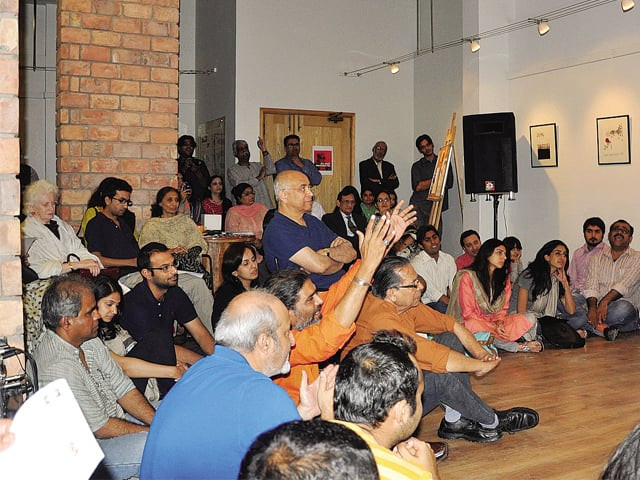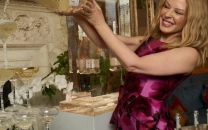Faiz Centennial celebration
The Second Floor steps forward to organise a celebration with film, music, dance, and readings of the poet’s works.

This was a special celebration, announced Sabeen Mahmud of T2F, because although the cafe planned to dedicate events to Faiz throughout the year, the particular evening had been set aside to exhibit the performances of people below the age of 30.
The audiences seemed captivated as the British-Pakistani film-director Faris Kermani’s documentary Faiz: Poet in Troubled Times (1987) was screened. The room was soon filled beyond capacity with people lining the walls and kneeling on the floor.
Including footage of Faiz’s birthplace and the educational institutions he attended, as well as interviews of his family and famous intellectuals like Sibte Hasan, Ralph Russell, Raza Kazim and poet Ahmed Faraz, Kermani’s documentary turned out to be a classic depiction of the poet’s life and times.
San Francisco-based filmmaker, Ali Kapadia’s artistic video interpretation of Faiz’s Tum Yeh Kehte Ho Ab Koi Chaara Nahin (You say that there is no solution now), was screened next. Accompanied by a recitation in Zia Mohyeddin’s voice, the film’s sepia mode presented a dusty landscape, dotted by wartime rubble and toy soldiers frozen in combat position and forgotten by time.
This was followed by Suhaee Abro’s choreographic interpretation of Faiz’s Aaj Bazaar Mein Pa-ba-jaulaan Chalo (Walk with fettered feet in the market today). The performance was impassioned and engaging, with an effective use of the dancer’s ghungru (ankle-bells). Although the transitions in pace were rather abrupt at times, they served to maintain an element of surprise for the audiences. Depictions of famous poems through dance has always been tricky, because unless the poem has a clear storyline, the beauty of abstract poetic imagery is hard to reproduce through a physical medium. Abro’s efforts were greeted with loud applause. Sara Haider’s voice rendered an interesting quality to the poetic verses, previously sung by Nayyara Noor.
In the next item, singer Hareem Sumbul and guitarist Omar Farooq’s rather upbeat rendition of Faiz’s Bol (Speak) was at first disconcerting for those familiar with Tina Sani’s famous version. But the effect was ultimately quite pleasant as Sumbul’s strong stage presence soon had the audiences humming along with her.
Changing the pace, there was a brief talk by Zahra Sabri, a student of Columbia University, who explored the basis of Faiz’s popularity. She challenged the notion that it was the poet’s socialist message that determined his wide appeal, saying that such themes were arguably stronger and clearer in the work of writers like Sahir Ludhianvi and Habib Jalib, but Faiz still outranked them by being the darling of the people. She also said that although Noon Meem Rashid’s work had left a far deeper impact on the course of modern Urdu poetry than Faiz’s work, the former’s birth centennial in 2010 had generated far less excitement. Instead, she attributed Faiz’s popularity to the fact that he has “so beautifully incorporated the elements of classical tradition of Urdu poetry into the poetry with modern themes.”
Closing the event, Sumbul returned with an energetic version of Hum Dekhenge.
Published in The Express Tribune, February 15th, 2011.



















COMMENTS
Comments are moderated and generally will be posted if they are on-topic and not abusive.
For more information, please see our Comments FAQ